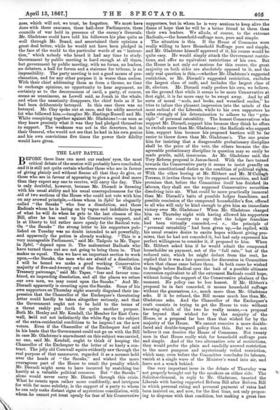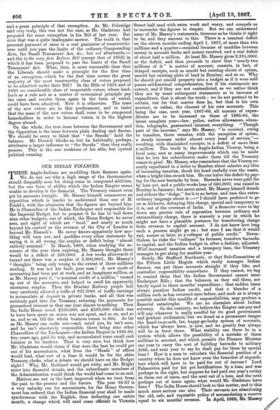THE LAST BATTLE.
BEFOBE these lines can meet our readers' eyes, the most .1,11 critical debate of the session will probably have concluded, .and it is still not quite certain whether those who are in favour -of giving plainly and without finesse all that they do give, or • those who are in favour of appearing to give a good deal more than they expect any one to receive, will carry the day. This is only doubtful, however, because Mr. Disraeli is finessing with his usual ability and his usual unscrupulousness for the -aid of two sections of the House who could not vote with him -on any avowed prineiple,—those whom in Sybil he elegantly called "the Sneaks" who fear a dissolution, and those • Radicals whom he is luring on by vague and indefinite hopes of what he will do when he gets to the last clauses of the Bill, after he has used up his Conservative support, and is at liberty to bid rather more openly for the Radical vote.
• On "the Sneaks" the strong letter to his supporters pub- lished on Tuesday was no doubt intended to act powerfully, and apparently the potion is already working. "This is a -very manageable Parliament," said Mr. Tadpole to Mr. Taper in Sybil, "depend upon it. The malcontent Radicals who have turned them out are not going to bring them in. That makes us equal. Then we have an important section to work upon,—the Sneaks, the men who are afraid of a dissolution. I will be bound we make a good working Conservative majority of five-and-twenty out of the Sneaks." "With the Treasury patronage," said Mr. Taper, "fear and favour com- bined, an impending dissolution, and all the places we refuse our own men, we may count upon the Sneaks." And Mr. _Disraeli apparently is counting upon the Sneaks. Some of his -own supporters on Thursday night scarcely disguised their im- pression that the Chancellor of the Exchequer's threatening letter could hardly be taken altogether seriously, and that the Government ought not to be held to the terms of threat rashly put forth for quite another purpose. Both Mr. Henley and Mr. Kendall, the Member for East Corn- wall, held out not indistinctly the white- flag on the subject of the extra-residential conditions to be imposod on the new -voters. Even if the Chancellor of the Exchequer had said _in his haste that the Government could not go on with the Bill in case Mr. Gladstone's amendment on this subject was carried, no one, said Mr. Kendall, ought to think of keeping the -Chancellor of the Exchequer to the letter of so hasty a con- tract. The jolly old Cornwall squire evidently saw through the real purpose of that manceuvre, regarded it as a menace held over the heads of "the Sneaks," and wished the more -courageous part of the House to remit the penalty which Mr. Disraeli might seem to have incurred by snatching too hastily at a valuable political resource. But "the Sneaks" alone would never carry Mr. Disraeli through this crisis. What he counts upon rather more confidently, and intrigues for with far more subtlety, is the support of a party to whom he can only make distant signs of mysterious conciliation, with w.hom_he cannot yet treat openly for fear of his Conservative supporters, but in whom he is very anxious to keep alive the flame of hope that he will be a better friend to them than their own leaders. We allude, of course, to the extreme Radicals,—the household-suffrage men, pure and simple. The situation is this. If the House of Commons were really willing to have Household Suffrage pure and simple, and Mr. Gladstone himself approved of it, his course would be quite easy. He would simply attack the Government restric- tions, and offer no equivalent restrictions of his own. But the House is not only not anxious for this course, the great majority on both sides are absolutely opposed to it, and the only real question is this,—whether Mr. Gladstone's suggested restriction, or Mr. Disraeli's suggested restriction, excludes the largest class of unfit, and includes the largest class of fit, electors. Mr. Disraeli really prefers his own, we believe, on the ground that while it seems to be more Conservative at first sight, it is far more easy to be swept away. And by all sorts of moral "nods, and becks, and wreathed smiles," he tries to infuse this pleasant impression into the minds of the most radical of the Liberals, while to his own supporters he talks strongly of his determination to adhere to the " prin- ciple " of personal rateability. The honest Conservatives who support Mr. Disraeli, support him because they think he offers to exclude more than Mr. Gladstone ; the Radicals who support him, support him because his proposed barriers will be far easier to throw down than Mr. Gladstone's. The one praise him for insisting that a disagreeable probationary discipline shall be the price of the vote, the others because the dis- agreeable probationary discipline in question may so easily be made gentle, mild, innocuous. As Mr. Gladstone said, the Tory Reform proposal is Janus-faced. With the face turned towards the Conservative party it seems to insist grandly on severe constitutional duties as the condition of political rights. With the other leering at Mr. Hibbert and Mr. M'Cullagh Torrens, it invites them to try its supposed securities, and half promises that, before the Committee itself has finished its labours, they shall see the supposed Conservative securities dissolving into air. What could be more practically immoral than Mr. Disraeli's baits of possible lodger franchises, and possible remission of the compound householder's fine, offered to all who will only be kind enough to give him an immediate victory over Mr. Gladstone? When Mr. Gladstone charged him on Thursday night with having allowed his supporters all over the country to say that the lodger franchise had been virtually conceded,—i. e., the principle of "personal rateability" had been given up,—he replied, with his usual evasive desire to excite hopes without giving pro-. mises, that he had not conceded it, but had only expressed his perfect willingness to consider it, if proposed to him. When Mr. Hibbert asked him if he would admit the compound householder on payment, not of the "full rate," but of the reduced rate, which he might deduct from the rent, he replied that it was a fair question for discussion in Committee when that clause came before them. In both cases he wished to dangle before Radical eyes the bait of a possible ultimate concession equivalent to all the extremest Radicals could hope, without losing the support of the Conservative phalanx of the moment. No policy can be leas honest. If Mr. Hibbert's proposal be in fact conceded, it means household suffrage without the guarantees, i.e., much more than Mr. Gladstone asks. If it be refused, the Bill means much less than Mr. Gladstone asks. And the Chancellor of the Exchequer's craft consists in trying to get the House to vote without knowing which of the two he really means,—a proposal far beyond that wished for by the majority of the House, or a proposal far less than that wished for by the majority of the House. We cannot conceive a more double- faced and double-tongued policy than this. But we do not believe it can deceive the House of Commons. Not twenty men in that House really wish for household suffrage pure and simple. And of the two alternative sets of restrictions, they would prefer the plain and candidly avowed restriction to the more pompous and mysteriously veiled restriction, which may, even before the Committee concludes its labours, vanish at a single wave of the Minister's wand into air, and leave not a wrack behind.
One very important issue in the debate of Thursday was not properly brought out by the speakers on either side. The Solicitor-General, in reply to Mr. Gladstone, taunted the Liberals with having supported Reform Bill after Reform Bill in which personal rating and personal. payment of rates had been insisted on, and now, for the first time, not only propos- ing to dispense with that condition, but making a great fuss and a great principle of that exemption. As Mr. Coleridge said very truly, this was not the case, as Mr. Gladstone had proposed the same exemption in his Bill of last year. But even that was a quite inadequate answer. The truth is, that personal payment of rates is a real guarantee of trustworthi- ness until you pass the limits of the ordinary Compounding Acts, the Small Tenements' Act, &c., but not afterwards,— and this is the very first Reform Bill (except that of 1852) in which it has been proposed to pass the limits of the Small Tenements' Act. What, then, is more reasonable than that the Liberals should make a principle for the first time of an exemption, which for the first time covers the great majority of the most trustworthy class of voters proposed to be admitted under their Bill? In the Bills of 1854 and of 1860 no considerable class of respectable voters, whose land- lords as a rule and as a matter of economical principle pay the rates and receive them again in the form of rental, could have been admitted. Now it is otherwise. The mass of the new voters are in this predicament, and to insist that the mass of the new voters shall cease to be compound householders in order to become voters, is in the highest degree absurd.
On the whole, the true issue between the Government and the Opposition is the issue between plain dealing and finesse. We should be sorry to think that "the Sneaks" hold the balance. Mr. Disraeli thinks so, but he habitually, perhaps, attributes a larger influence to "the Sneaks" than they really possess. This is the one weakness of his able, but cynical political cunning.































 Previous page
Previous page